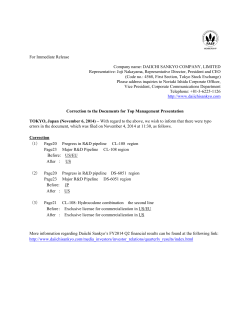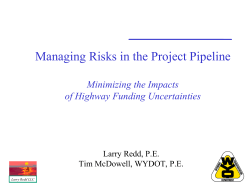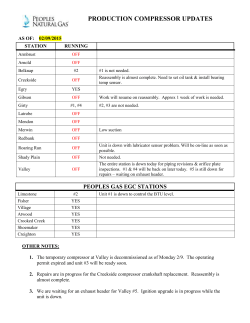
Dominion`s Atlantic Coast Pipedream: Lies and Numbers
For Immediate Release Contact: Ernie Reed 434-‐971-‐1647 lec@wildvirginia.org Dominion’s Atlantic Coast Pipedream: Lies and Numbers It is difficult to assess just how deep the deception runs in Dominion’s efforts to ram the Atlantic Coast Pipeline down the throats of communities and rate-‐payers in Virginia. Dominion’s latest effort, a report entitled The Economic Impacts of the Atlantic Coast Pipeline, fails to be a credible and comprehensive analysis of the Atlantic Coast Pipeline (ACP)’s impacts on market area natural gas and electric prices, or on the impacts to regional economies. Dominion’s press release claims that switching to using cheaper natural gas to generate electricity will benefit the economy. Dominion has been lobbying recently in Richmond to pass a bill (SB 1349) that would place a floor on electricity rates and exempt them from SCC oversight for a number of years. “Dominion is doing everything they can to pass the ‘Rate-‐payer rip off’ bill by whining to legislators how much it will cost to close coal fired plants due to oncoming regulations… but now they are saying that this very same switch will save tons of money? Dominion can’t have it both ways,” says Joanna Salidis, Friends of Nelson’s President. “The numbers are based on economic, market and demand assumptions that are unstated, unknown and highly speculative,” said Ernie Reed, of Friends of Nelson. “Dominion has created an economic pipedream and somehow expects that the project will conform to its sci-‐fi scenario.” “Especially egregious is that the report focuses on only one side of the balance sheet,” Reed continued. “The economic and social costs to communities of construction, monitoring and maintenance, including the effect of natural gas exports on domestic gas prices, which are real costs, are neither acknowledged nor addressed in the report. The flagrant omission of these costs is both deceitful and disingenuous.” Costs unaddressed in the report include • • • • • • • • • • • • • • • • • • • • • Loss of property values to landowners Loss of privacy to landowners Loss to businesses during construction Loss of natural scenic value Devalued businesses and business opportunities Loss of Property Rights through eminent domain to hundreds of property owners Costs to localities and those down stream of increased sedimentation and impacts to water supplies Costs to National Forests, The Appalachian Trail and The Blue Ridge Parkway of impaired water, wildlife, native plants, viewsheds and recreation values. Costs to property owners of attorney fees to fight and oppose unconstitutional takings the large-‐scale export of gas, which is not in the public interest. Costs of local emergency services and first-‐responders in the event of an emergency Costs to water, soil and personal property in the event of an explosion or accident Costs to local and regional renewable/wind/solar businesses and suppliers who must compete with dirty carbon intensive energy generation Lifecycle health and climate costs of methane leakage at source, storage, distribution and compressor station points Costs of adding significant carbon loads to the atmosphere because, yes, burning gas releases significant amounts of carbon The security dangers inherent in the large-‐scale international energy market Costs to the West Virginia communities who bear the brunt of social, environmental and health costs inherent to the fracking process and industry Costs of repairing roads, damaged by heavy truck traffic during construction Costs for damage to water sources and structures due to blasting during construction Loss of property taxes through devalued properties, both on and near the route Loss of residents and businesses (and attendant taxes) due to pipeline-‐ caused relocation Costs of increased healthcare and missed work days due to stress of eminent domain proceedings, living in the blast zone, or other safety or economic worries brought on by the pipeline Friends of Nelson is producing a report on the economic and socioeconomic costs to Nelson County of the construction, maintenance, operation, and monitoring of the Atlantic Coast Pipeline. “The economy of Nelson County is based on tourism, agriculture, recreation and the scenic beauty of the Rockfish Valley. These and so much more are threated by the proposed pipeline,” said Joanna Salidis. “It makes me sick to my stomach to hear Dominion crow about economic benefits when the truth is their pipeline is nothing more than the large scale transfer of wealth from counties like ours on the route to their shareholders’ pockets. Our Pipeline Impact Study will give us numbers of our own.” The study is financed by Nelson County landowners and supporters and will be completed in May.
© Copyright 2025















